1992 VOLKSWAGEN CARAVELLE check oil
[x] Cancel search: check oilPage 101 of 164

Downloaded from www.Manualslib.com manuals search engine
GENERAL
MAINTENANCE
Gearbox
oil
Specifications
Manual
gearbox
and
final
drive
•
Gear
oil,
API-GL
4, SAE 80 or
•
Gear
oil, G 50, SAE 75 W-90
Automatic
gearbox
• Final drive:
Gear
oil, G 50, SAE 75 W-90 I Gearbox part: ATF Dexron®
Checking oil
level
rVith
a
manual
gearbox
and
final
drive
the oil level does not need checking.
'.ith the
automatic
gearbox
the oil
•e.
el in the final drive does not need check- *g either.
"he
ATF
level
in
gearbox
part
must ": .'/ever be checked in between the inter-
•BS
given in Service Schedule. To do this
ire vehicle must be standing on a level sur-
fe:e.
The
level must only be checked when
He ATF is
warm.
(Approximately 10 km
Irrer
starting from
cold,
the ATF has re
tted the required temperature.) If fluid is
l:: :: or too hot the reading will be incorrect.
1
he engine must be running at idling
speed,
the handbrake must be applied and the se lector lever at "N".
To
check, pull dipstick (see Fig.) out, wipe
with a clean lint-free rag and then insert it
fully
again.
Pull
the dipstick out and check ATF
level.
When
the ATF is
warm
the
level
must
be
between
the two
marks
- other
wise
the vehicle must be taken to a
Volks
wagen
dealer without delay so that they can
find the reason for the incorrect
level.
It is not sufficient to merely top up or drain off
ATF.
Changing oil
For
the manual
gearbox
with
final
drive
the oil does not need changing.
For the
automatic
gearbox
the :
the final drive does not need
chariC-g
either. The ATF in gearbox part must how
ever
be changed at the intervals given in
Service
Schedule.
Because of the disposal
prob
lems,
the
special
tools
necessary
and the
specialist
knowledge
re
quired,
the ATF
changing
should
preferably
be
done
by a
Volkswagen
dealer.
Notes
•
When
there
is no
lubricant
in the
manual
or
automatic
gearbox,
the
engine
must
not be
started
and the
vehicle may only be
towed
with
the
driving
wheels
lifted.
• No
additives
may be
mixed
with
the lubricants.
www.vwT4camper.info - a useful website for owners and enthusiasts of VW T4 Transporter Campervans
Page 102 of 164
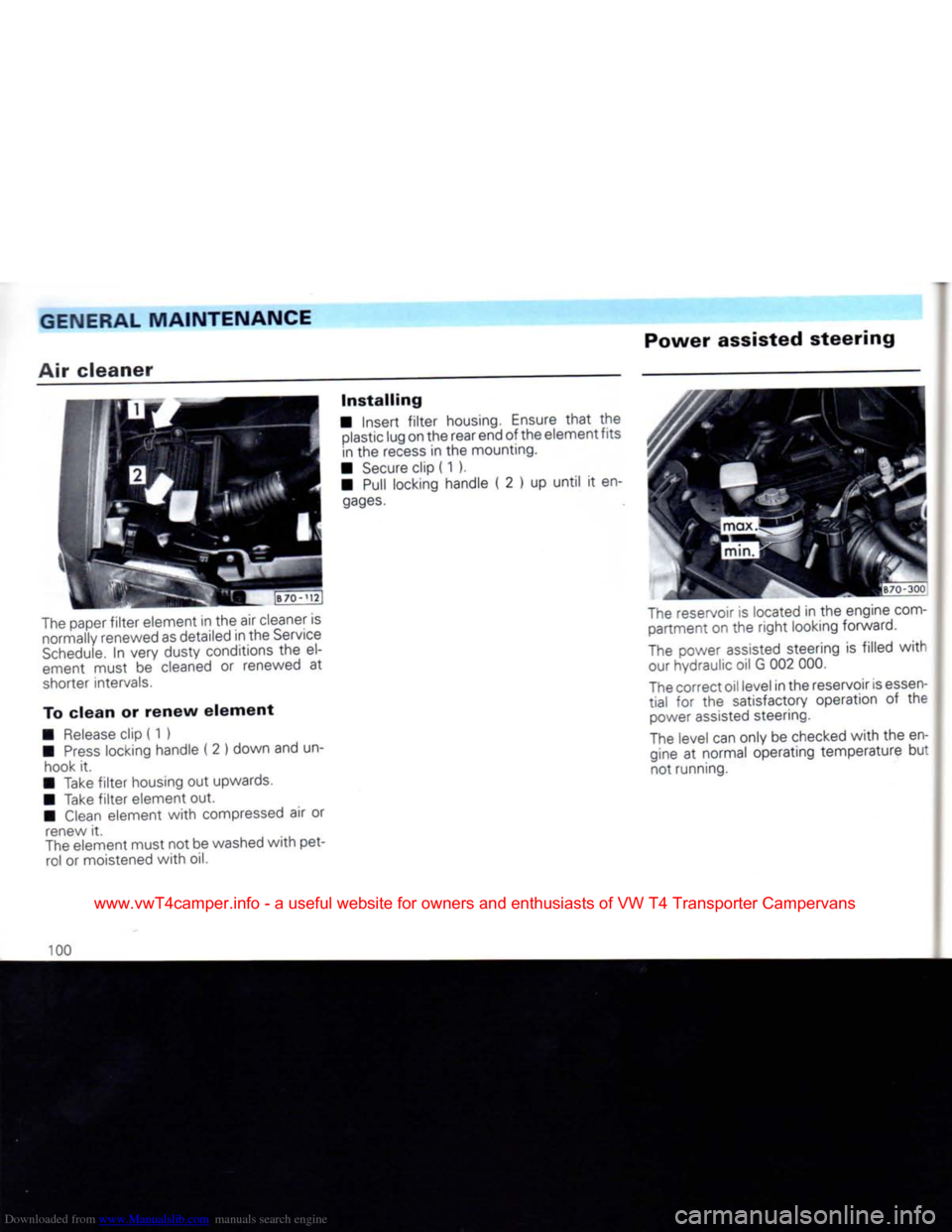
Downloaded from www.Manualslib.com manuals search engine
GENERAL
MAINTENANCE
Air
cleaner
Power
assisted
steering
The
paper
filter
element in the air cleaner is normally renewed as detailed in the Service
Schedule.
In very dusty conditions the el
ement must be cleaned or renewed at
shorter intervals.
To clean or
renew
element
•
Release
clip (1 ) •
Press
locking handle ( 2 ) down and un hook it.
• Take
filter
housing out upwards.
• Take
filter
element out. •
Clean
element
with
compressed air or renew it.
The
element must not be washed
with
pet rol or moistened
with
oil.
Installing
• Insert
filter
housing. Ensure
that
the
plastic
lug on the rearend of the elementfits
in the recess in the mounting.
• Secure clip (1 ).
• Pull locking handle ( 2 ) up until it en
gages.
The
reservoir is located in the engine compartment on the
right
looking forward.
The
power assisted steering is filled
with
our hydraulic oil G 002 000.
The
correct oil level in the reservoir is
essen
tial for the satisfactory operation of the power assisted steering.
The
level can only be checked
with
the en gine at normal operating temperature but not running.
100
www.vwT4camper.info - a useful website for owners and enthusiasts of VW T4 Transporter Campervans
Page 103 of 164
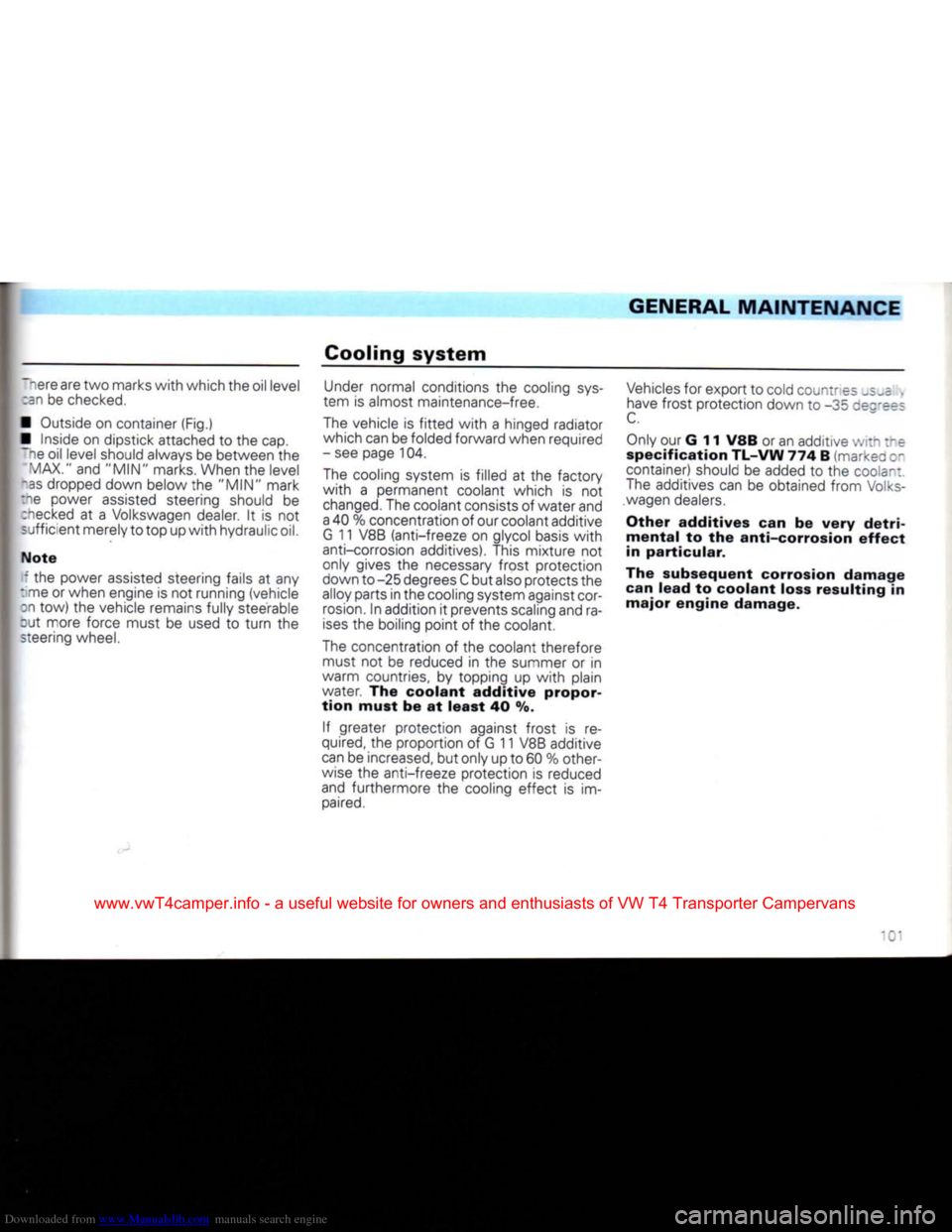
Downloaded from www.Manualslib.com manuals search engine
GENERAL
MAINTENANCE
nere are two marks
with
which the oil level
:an be
checked.
• Outside on container (Fig.) • Inside on dipstick attached to the cap. ~he oil level should always be between the
MAX."
and "MIN" marks. When the level
"as
dropped down below the "MIN" mark
:^e
power assisted steering should be
:necked
at a Volkswagen dealer. It is not
sufficient merely to top up
with
hydraulic oil.
Note
f the power assisted steering fails at any
: me or when engine is not running (vehicle on tow) the vehicle remains fully steerable cut more force must be used to
turn
the
steering wheel. Cooling
system
Under
normal conditions the cooling
sys
tem is almost maintenance-free.
The vehicle is
fitted
with
a hinged radiator
which can be folded forward when required
- see page 104.
The cooling system is filled at the factory
with
a permanent coolant which is not
changed.
The coolant consists of water and
a
40 % concentration of our coolant additive
G
11 V8B (anti-freeze on glycol basis
with
anti-corrosion additives). This mixture not
only gives the necessary frost protection
down to -25 degrees C but also protects the
alloy parts in the cooling system against cor
rosion.
In addition it prevents scaling and ra
ises
the boiling point of the coolant.
The concentration of the coolant therefore must not be reduced in the summer or in
warm countries, by topping up
with
plain
water. The
coolant
additive
propor
tion
must
be at
least
40 %.
If greater protection against frost is re
quired, the proportion of G 11 V8B additive
can
be increased, but only up to 60 % other
wise the anti-freeze protection is reduced
and furthermore the cooling effect is im
paired.
Vehicles
for export to cold countries -s~a .
have frost protection down to -35 decrees
C.
Only
our G 11 V8B or an additive v/rs :~e
specification
TL-VW 774 B (markea or
container) should be added to the coolant.
The additives can be obtained from
Volks
wagen dealers.
Other
additives
can be
very
detri
mental
to the
anti-corrosion
effect
in
particular.
The
subsequent
corrosion
damage
can
lead
to
coolant
loss
resulting
in
major
engine
damage.
www.vwT4camper.info - a useful website for owners and enthusiasts of VW T4 Transporter Campervans
Page 104 of 164
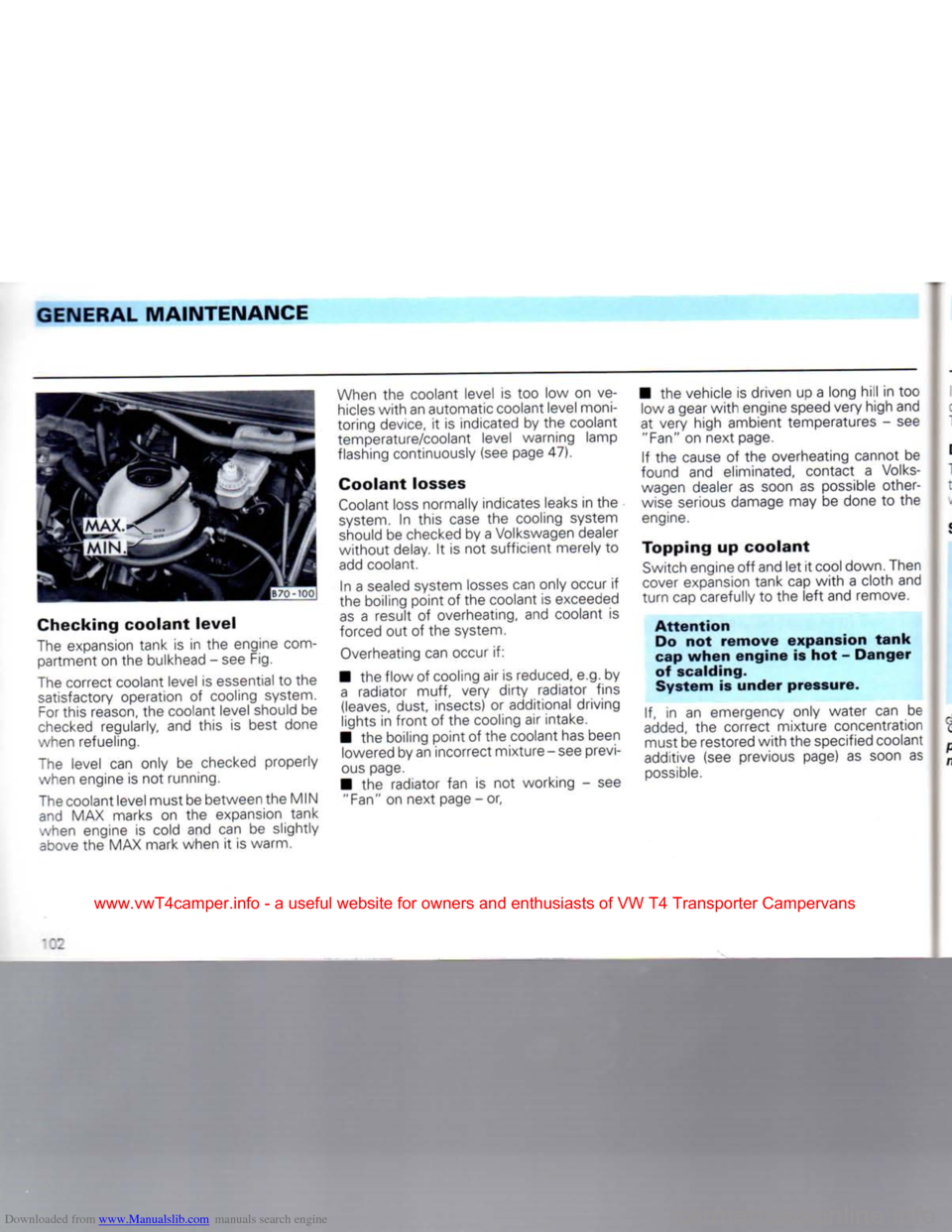
Downloaded from www.Manualslib.com manuals search engine
GENERAL
MAINTENANCE
Checking
coolant
level
The
expansion tank
is in the
engine
com
partment on the bulkhead
-
see Fig.
The
correct coolant level
is
essential
to
the satisfactory operation
of
cooling system.
For
this reason, the coolant level should
be
checked
regularly,
and
this
is
best done
when refueling.
The
level
can
only
be
checked properly
when engine
is
not running.
The
coolant level must be between the MIN
and
MAX marks
on the
expansion tank
when engine
is
cold
and can be
slightly
above
the MAX mark when
it
is warm.
When
the
coolant level
is too low on ve
hicles
with
an automatic coolant level moni
toring device,
it is
indicated by the coolant
temperature/coolant level warning lamp
flashing continuously (see page 47).
Coolant
losses
Coolant
loss normally indicates leaks in the
system.
In
this
case
the
cooling system
should
be checked by a Volkswagen dealer
without
delay.
It is
not sufficient merely
to
add
coolant.
In
a
sealed system
losses
can only occur
if
the boiling point
of
the coolant is exceeded
as
a
result
of
overheating, and coolant
is
forced out
of
the system.
Overheating can occur
if:
• the flow
of
cooling air is reduced, e.g.
by
a
radiator
muff,
very
dirty
radiator fins
(leaves,
dust, insects)
or
additional driving
lights
in
front
of
the cooling air intake.
• the boiling point
of
the coolant has been lowered by an incorrect mixture
-
see previ
ous
page.
•
the
radiator
fan is not
working
- see
"Fan"
on next page
-
or, • the vehicle
is
driven up
a
long hill
in too
low a gear
with
engine speed very high and
at very high ambient temperatures
-
see
"Fan"
on
next page.
If
the
cause
of the
overheating cannot
be
found
and
eliminated, contact
a
Volks
wagen dealer
as
soon
as
possible other
wise
serious damage may
be
done
to the
engine.
Topping
up
coolant
Switch
engine
off
and let
it
cool down. Then
cover
expansion tank cap
with
a
cloth and
turn
cap carefully
to
the
left
and remove.
Attention
Do
not
remove
expansion
tank
cap
when
engine
is
hot
-
Danger
of scalding.
System
is
under
pressure.
If, in an
emergency only water
can be
added,
the
correct mixture concentration must be restored
with
the specified coolant
additive (see previous page)
as
soon
as
possible.
•02
www.vwT4camper.info - a useful website for owners and enthusiasts of VW T4 Transporter Campervans
Page 107 of 164
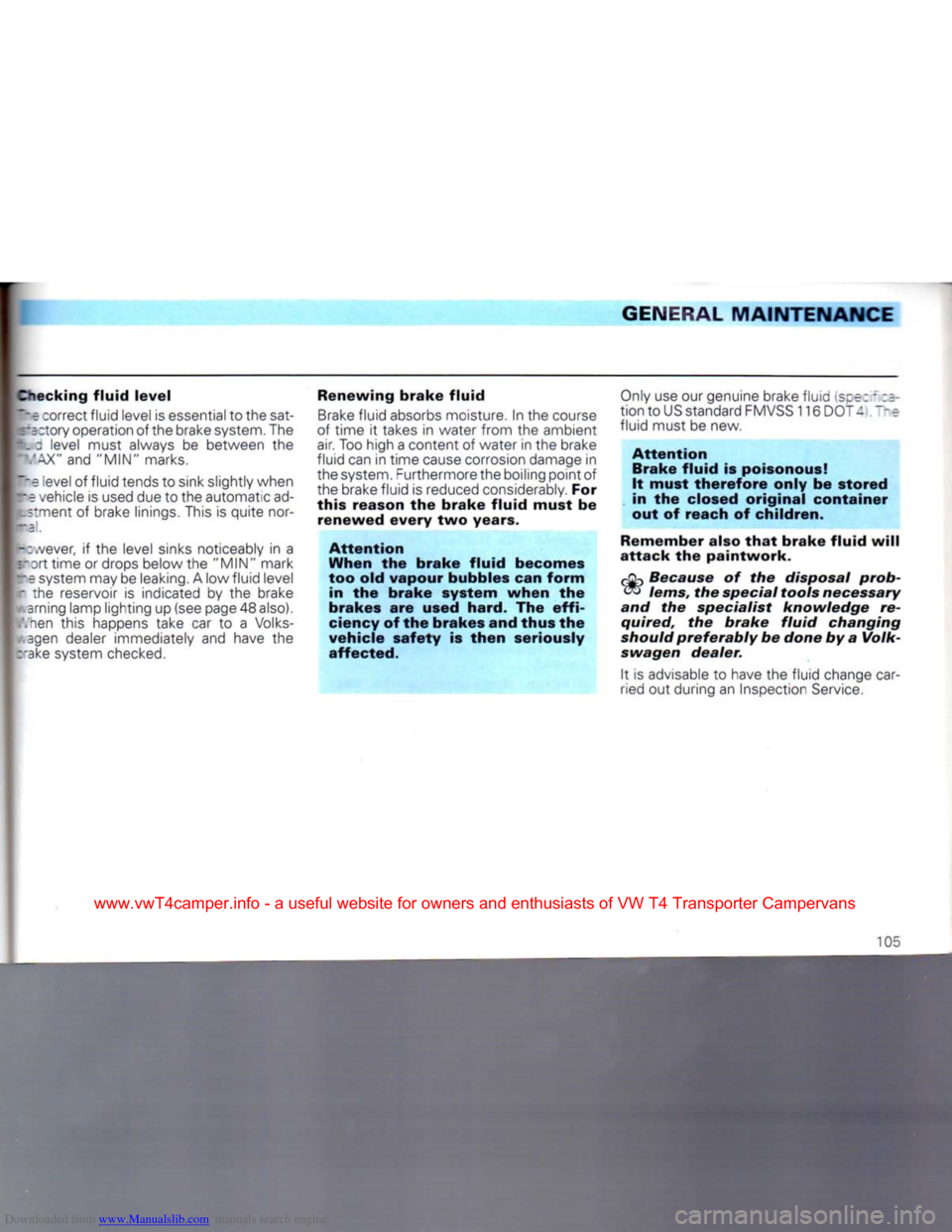
Downloaded from www.Manualslib.com manuals search engine
GENERAL
MAINTENANCE
'necking fluid level
Pe :orrect fluid level is essential to the sat-
:~=
:tory operation of the brake system. The
fc. Z level must always be between the
AX"
and "MIN" marks.
~- a "evel of fluid tends to sink slightly when
"a vehicle is used due to the automatic ad- ::ment of brake linings. This is quite nor-
-rwever, if the level sinks noticeably in a
srorttime or drops below the "MIN" mark
re system may be leaking. A low fluid level " the reservoir is indicated by the brake
w.arning lamp lighting up (see page 48 also), .nen this happens take car to a Volks
wagen dealer immediately and have the
cake system checked. Renewing brake fluid
Brake fluid absorbs moisture. In the course
of time it takes in water from the ambient
air. Too high a content of water in the brake
fluid can in time cause corrosion damage in
the system. Furthermore the boiling point of
the brake fluid is reduced considerably. For
this reason the brake fluid must be renewed every two years.
Attention
When the brake fluid becomes
too old vapour bubbles can form in the brake system when the
brakes are used hard. The
effi
ciency of the brakes and thus the
vehicle safety is then seriously
affected.
Only use our genuine brake fluio (see: - ra
tion to US standard FMVSS 116 DO~-
.
~-e
fluid must be new.
Attention Brake fluid is poisonous!
It must therefore only be stored in the closed original container
out of reach of children.
Remember also that brake fluid will
attack the paintwork. Because of the disposal
prob
lems,
the special tools necessary
and the specialist knowledge re
quired,
the brake fluid changing
should preferably be done by a
Volk
swagen
dealer.
It is advisable to have the fluid change car
ried out during an Inspection Service.
www.vwT4camper.info - a useful website for owners and enthusiasts of VW T4 Transporter Campervans
Page 112 of 164
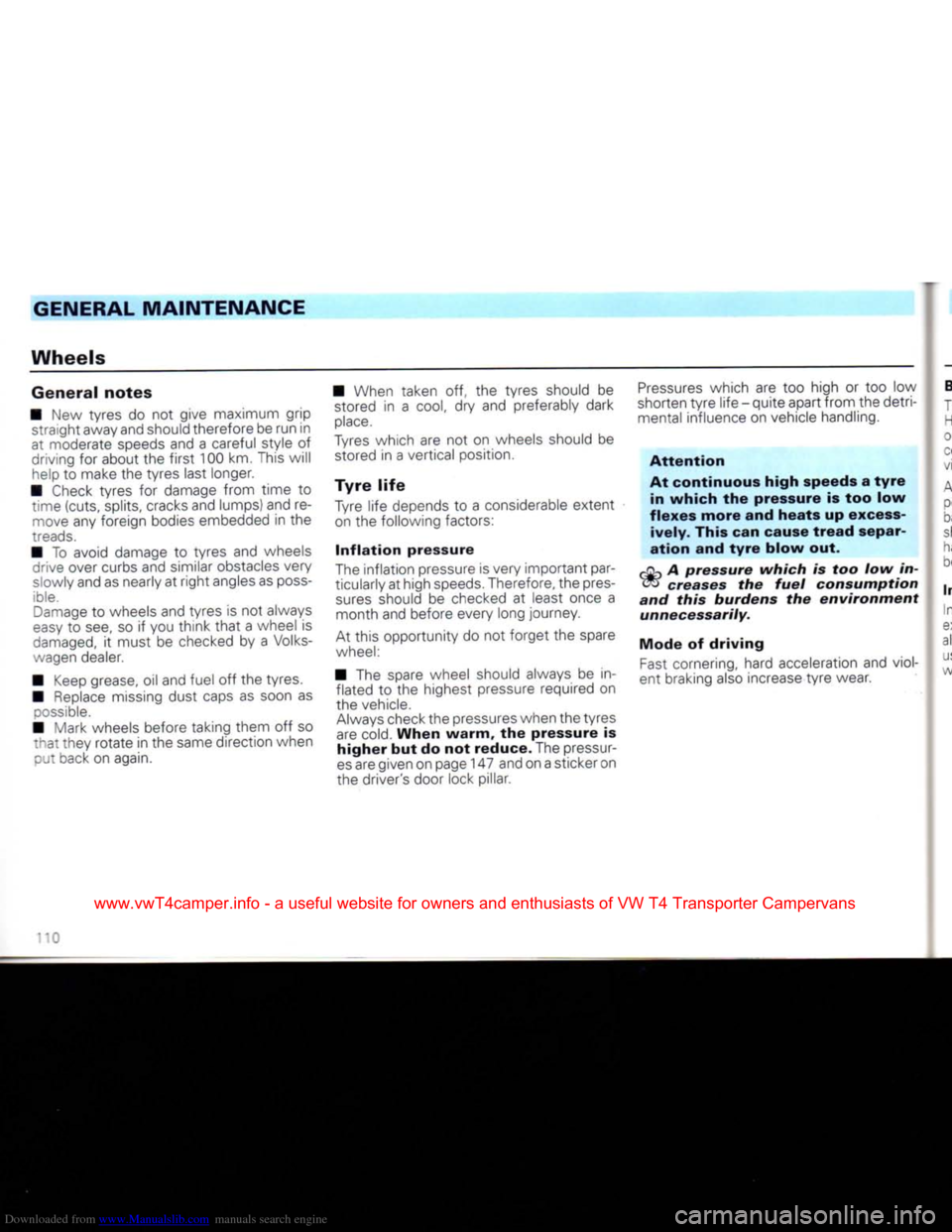
Downloaded from www.Manualslib.com manuals search engine
GENERAL
MAINTENANCE
Wheels
General
notes
• New tyres do not give maximum grip straight away and should therefore be run in
at moderate speeds and a careful style of
driving for about the
first
100 km. This will help to make the tyres last longer.
• Check tyres for damage from time to time (cuts, splits, cracks and lumps) and remove any foreign bodies embedded in the
treads.
• To avoid damage to tyres and wheels crive over curbs and similar obstacles very
slowly and as nearly at
right
angles as
poss
ible.
Damage
to wheels and tyres is not always
easy
to see, so if you
think
that
a wheel is
damaged,
it must be checked by a Volks
wagen dealer.
• Keep grease, oil and fuel off the tyres.
• Replace missing dust caps as soon as
possible.
• Mark wheels before taking them off so
that
they rotate in the same direction when put back on again. • When taken off, the tyres should be
stored in a
cool,
dry and preferably dark
place.
Tyres
which are not on wheels should be stored in a vertical position.
Tyre
life
Tyre life depends to a considerable extent on the following factors:
Inflation
pressure
The inflation pressure is very important par
ticularly at high
speeds.
Therefore, the pres
sures
should be checked at least once a month and before every long journey.
At this opportunity do not forget the spare
wheel:
• The spare wheel should always be in flated to the highest pressure required on
the vehicle.
Always
check the pressures when the tyres are cold.
When
warm,
the pressure is
higher
but do not
reduce.
The pressur
es
are given on page 147 and on a sticker on
the driver's door lock pillar.
Pressures
which are too high or too low
shorten
tyre
life - quite apart from the detri mental influence on vehicle handling.
Attention
At
continuous
high
speeds a
tyre
in
which
the pressure is too low
flexes
more
and
heats
up excess
ively.
This can cause
tread
separ
ation
and
tyre
blow
out.
pCU
A
pressure
which
is too low in- oo
creases
the
fuel
consumption
and
this
burdens
the
environment
unnecessarily.
Mode
of
driving
Fast
cornering, hard acceleration and viol
ent braking also increase
tyre
wear.
'0
www.vwT4camper.info - a useful website for owners and enthusiasts of VW T4 Transporter Campervans
Page 117 of 164
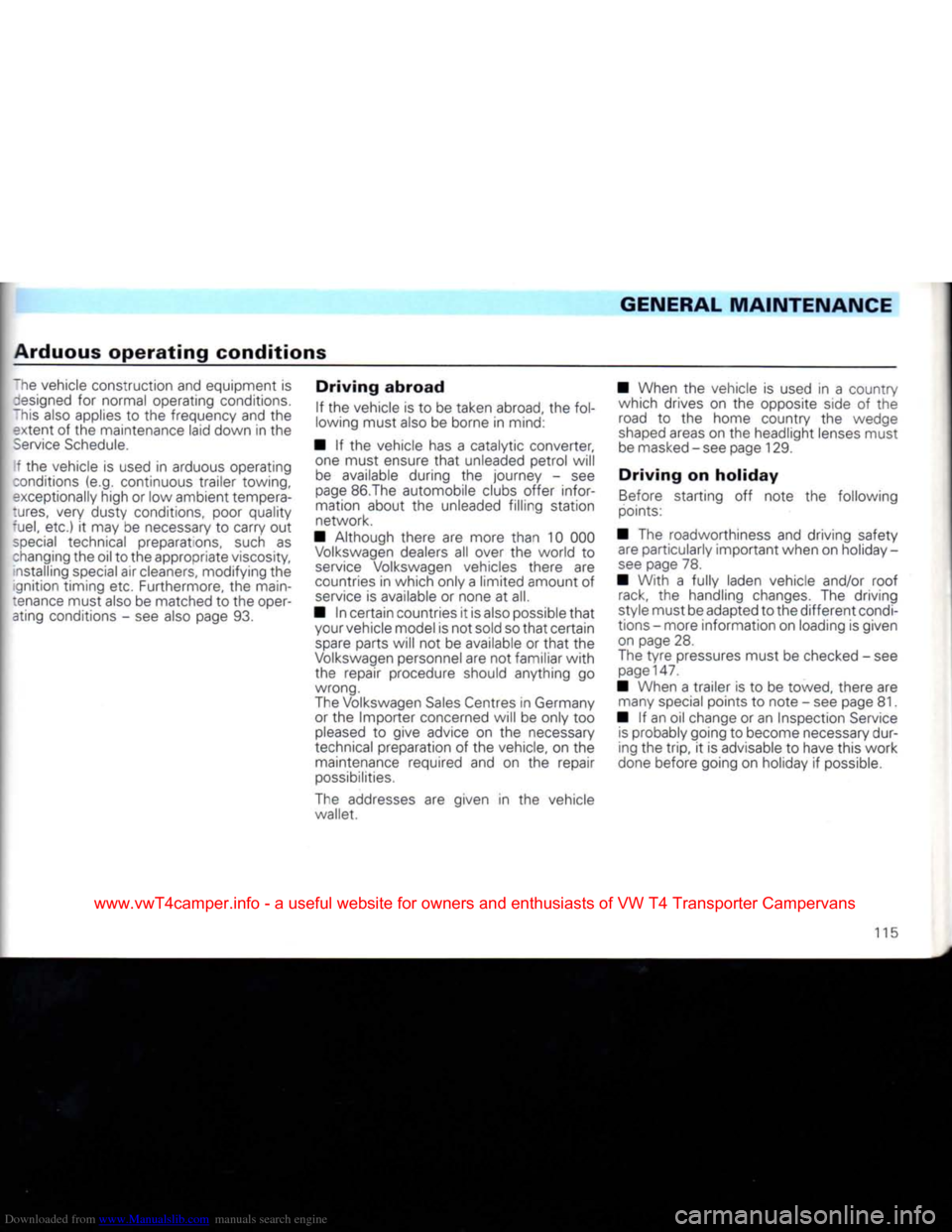
Downloaded from www.Manualslib.com manuals search engine
GENERAL
MAINTENANCE
Arduous
operating
conditions
ne vehicle construction and equipment is
resigned for normal operating conditions.
his also applies to the frequency and the
extent of the maintenance laid down in the
service
Schedule.
f the vehicle is used in arduous operating
conditions (e.g. continuous trailer towing,
exceptionally high or low ambient tempera-
:ures,
very dusty conditions, poor quality
ruel,
etc.) it may be necessary to carry out
special
technical preparations, such as ;hanging the oil to the appropriate viscosity, ^stalling special air cleaners, modifying the
ignition timing etc. Furthermore, the main
tenance must also be matched to the oper
ating conditions - see also page 93.
Driving
abroad
If the vehicle is to be taken abroad, the fol
lowing must also be borne in mind:
• If the vehicle has a catalytic converter, one must ensure
that
unleaded petrol will be available during the journey - see
page 86.The automobile clubs offer infor mation about the unleaded filling station
network.
• Although there are more than 10 000
Volkswagen
dealers all over the world to
service
Volkswagen vehicles there are
countries in which only a limited amount of
service
is available or none at all.
• In certain countries it is also possible
that
your vehicle model is not soid so
that
certain
spare
parts will not be available or
that
the
Volkswagen
personnel are not familiar
with
the repair procedure should anything go
wrong.
The Volkswagen
Sales
Centres in Germany or the
Importer
concerned will be only too
pleased
to give advice on the necessary
technical preparation of the vehicle, on the maintenance required and on the repair
possibilities.
The addresses are given in the vehicle wallet. • When the vehicle is used in a country
which drives on the opposite side of the road to the home country the wedge
shaped
areas on the headlight lenses must be masked - see page 129.
Driving
on
holiday
Before starting off note the following
points:
• The roadworthiness and driving safety are particularly important when on holiday-
see
page 78.
• With a fully laden vehicle and/or roof rack, the handling changes. The driving
style must be adapted to the different condi
tions - more information on loading is given
on page 28.
The
tyre
pressures must be checked - see
page147.
• When a trailer is to be towed, there are many special points to note - see page 81.
• If an oil change or an Inspection Service
is
probably going to become necessary dur
ing the
trip,
it is advisable to have this work
done before going on holiday if possible.
115
www.vwT4camper.info - a useful website for owners and enthusiasts of VW T4 Transporter Campervans
Page 118 of 164
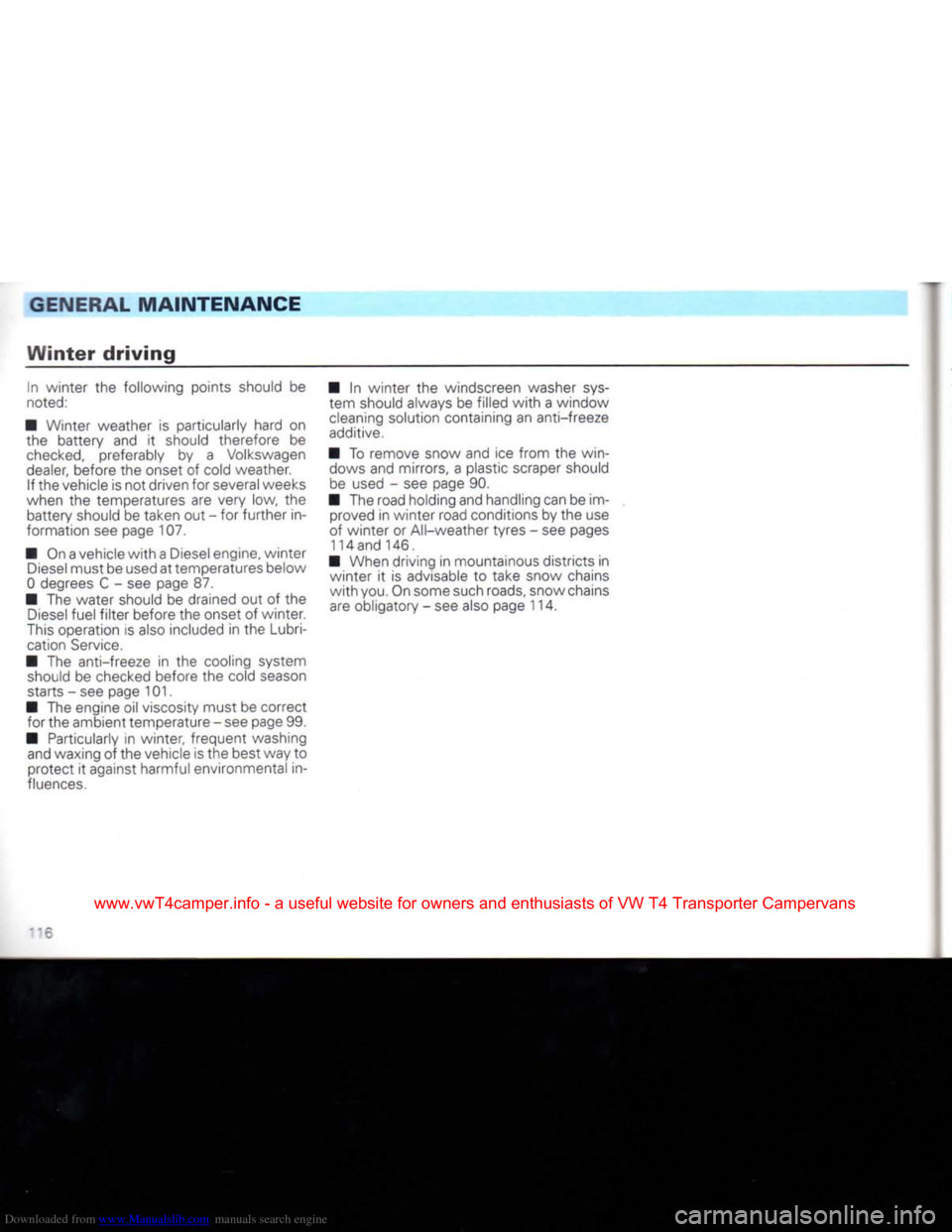
Downloaded from www.Manualslib.com manuals search engine
GENERAL
MAINTENANCE
Winter
driving
T
Ac
The an«
safe
high
ensi
supf
with
poin
sub:
tech latei
• /
fori
any
thro
SWc
pete
A
In
m
s<
V
G
u
P
SI
a
s|
r<
In winter the following points should be
noted:
• Winter weather is particularly hard on the
battery
and it should therefore be
checked,
preferably by a Volkswagen
dealer, before the onset of cold weather. If the vehicle is not driven for several weeks
when the temperatures are very low, the
battery
should be taken out - for
further
in
formation see page 107.
• On a vehicle
with
a Diesel engine, winter
Diesel
must be used at temperatures below
0 degrees C - see page 87.
• The water should be drained out of the
Diesel
fuel
filter
before the onset of
winter.
This
operation is also included in the Lubri cation
Service.
• The anti-freeze in the cooling system should be checked before the cold
season
starts - see page 101.
• The engine oil viscosity must be correct for the ambient temperature - see page 99.
• Particularly in
winter,
frequent washing and waxing of the vehicle is the best way to protect it against harmful environmental in
fluences.
• In winter the windscreen washer
sys
tem should always be filled
with
a window
cleaning solution containing an anti-freeze
additive.
• To remove snow and ice
from
the win dows and mirrors, a plastic scraper should be used - see page 90.
• The road holding and handling can be im proved in winter road conditions by the use
of winter or All-weather tyres - see pages 114and146.
• When driving in mountainous districts in winter it is advisable to take snow chains
with
you. On some such roads, snow chains
are obligatory - see also page 114.
www.vwT4camper.info - a useful website for owners and enthusiasts of VW T4 Transporter Campervans